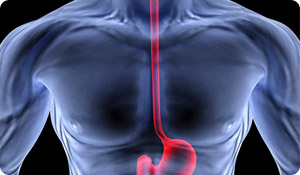
A 2010 study presented at Society of Nuclear Medicine's Annual Meeting found evidence that gastroesophageal reflux disease (GERD) may be due to a lack of muscle tone, or motility, in the esophageal muscles.
Using molecular imaging, 49 participants (known or suspected of having GERD) were scanned while upright and again lying down to gauge ineffective esophageal motility, or poor functioning of the muscles of the esophagus and lower-esophageal sphincter.
From the Society of Nuclear Medicine press release:
In patients who had symptoms, but showed no demonstrable GERD, almost half showed delayed esophageal motility while lying down. This suggests the presence of esophageal motility disorder—even before GERD becomes demonstrable—which points to the possibility of abnormal esophageal motility being the primary disorder leading to GERD.
Overall, the study shows strong evidence for the causal relationship of ineffective esophageal motility and GERD. If confirmed in larger trials, potential drug treatments could be developed to help improve this reduced motility and to facilitate normal esophageal function, providing patients definitive relief from gastroesophageal reflux disease.
The Current Thinking on GERD
"The data has been conflicting, but more and more data seems to be that GERD isn't actually due to decreased tone, but to these episodes of relaxation of the muscle—what we call transient lower esophageal sphincter relaxation (TLESR)," says Maged Rizk, MD, Director, Chronic Abdominal Pain Center at the Cleveland Clinic. By preventing the episodes, symptoms can be improved. (Researchers are still looking at whether or not medications that focus on TLESRs can reduce symptoms of acid reflux.)
Currently, GERD management is based on different medications that reduce acid secretions. Over-the-counter remedies like antacids and H2 blockers, such as Zantac®, Tagamet® and Pepcid®, can control occasional heartburn. But Rizk says anyone experiencing acid reflux symptoms more than twice a week may benefit from prescription medication, such as proton pump inhibitors, which he says take a little longer to work initially but are longer acting. Proton pump inhibitors, such as Prilosec®, Nexium®, and Prevacid® also work to heal any damage done to the esophagus.
An estimated 60 million Americans suffer from heartburn at least once a month, and some studies have suggested that more than 15 million Americans suffer heartburn symptoms each day, according the American College of Gastroenterology.
Symptoms of heartburn more than twice a week may signal gastroesophageal reflux disease (GERD), a condition in which stomach acid flows backward and up into the esophagus. Symptoms include burning sensation in the chest, an acidic taste in the mouth, chest pain, difficulty swallowing, and regurgitation (especially when you lean forward).
Sources:
http://www.snm.org/index.cfm?PageID=9746
Maged Rizk, MD, Director, Chronic Abdominal Pain Center at the Cleveland Clinic.
http://patients.gi.org/topics/acid-reflux/
http://digestive.niddk.nih.gov/ddiseases/pubs/gerd/index.aspx





